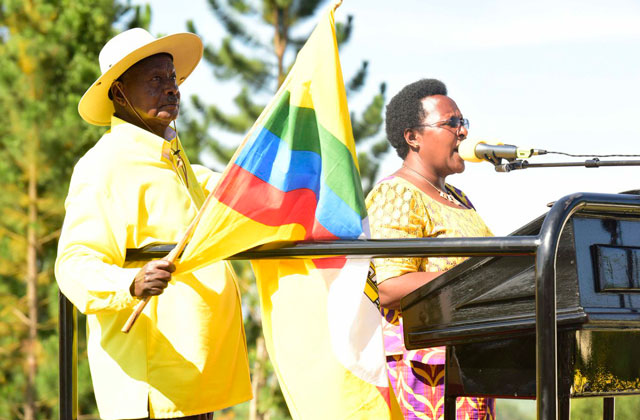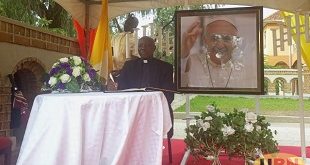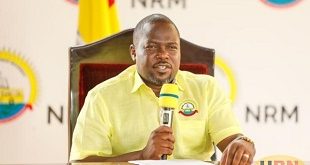
How the bye-election shows us that Besigye is the best ally in Museveni’s pursuit of power
THE LAST WORD |Andrew M. Mwenda | Last week, NRM lost a bye-election in Rukungiri in spite of (and I think also because of) deploying all its resources in the area. The army and police made a strong presence. Many NRM’s big guns from the district and the secretariat camped in Rukungiri. President Yoweri Museveni also visited the district twice; on the first visit donated 500 motorcycles, 25 Fuso trucks, seven tractors, 20 commuter taxis and high powered woodwork machines; on the second visit, he campaigned energetically.
Yet NRM’s candidate for Rukungiri District Woman Member of Parliament, Winnie Matsiko, got 46,000 votes against FDC’s Betty Muzanira with 50,000 votes. This was a sharp fall for Matsiko who got 61,000 votes against Muzanira’s 58,000 in the 2016 elections. Matsiko’s votes fell by 15,000 votes while Muzanira by only 8,000. It shows that Matsiko lost in large part because many NRM supporters did not turnout to vote.
This may have partly been due to the unpopularity of the amendment of the constitution to remove age limits: the other, the extension of the life of parliament for two more years. Matsiko was associated with both actions. Secondly, Museveni’s use of money had a negative effect on the NRM base. He gave it to groups many of which were allied to the FDC. Many NRM supporters felt left out and stayed away in protest.
But this also shows that Museveni’s reliance on money to win support has become increasingly counterproductive. It has led to a culture in NRM that for anything small to be done, huge sums of money must be spent “buying off people”. I am reliably informed that many people in Rukungiri were only willing to work for NRM if they had been paid. The use of money in this crass manner has inflicted untold damage on Museveni’s brand. His opponents have now successfully used it to brand anyone who defends the president a hired gun.
However, FDC has a different version of events. According to them, Matsiko’s 61,000 votes in the 2016 were a result of ballot stuffing. There may be truth in this allegation but it can only be part of the story. FDC is given to wild claims and exaggerated allegations. However, if their allegations hold any water, they lead to a more important question: why didn’t NRM successfully rig again and get the same numbers again?
FDC says that this time it was able to deploy its resources in this one district and protect votes and stop NRM from ballot stuffing.
This claim actually demonstrates that a well-organised opposition can surmount intimidation, bribery and rigging. Yet Besigye and his confederates have always claimed that there is no way anyone can defeat Museveni via elections because of intimidation and rigging. The story of Rukungiri, like the story of Kyadondo East and Jinja East where Bobi Wine aka Robert Kyagulanyi and Paul Mwiru respectively won against all odds clearly demonstrates that opposition victory is possible.
Therefore, if the NRM rigs itself to victory, it is because the opposition is weak, unorganised, disorganised and under organised. It means that where rigging is successful, it is only because the opposition is unable to mount relatively unified and concerted action to protect its votes and stop ballot stuffing. The solution, therefore, is not to discount the opportunity available to cause an electoral upset but to build capacity to counter rigging. This means that the opposition strategy should be to convince Ugandans that defeat of Museveni is possible through elections – if only everyone who cares about change can turn out to vote and stay at the polling center to protect opposition votes and block NRM from rigging.
Yet this message is counter to the message Besigye has been feeding to his supporters for over a decade now. Besigye claims that he has won all the four elections he has contested and been denied power by Museveni because of rigging. This message is very discouraging for potential voters. It shows voting is meaningless. For many people, it does not make sense to vote, win and still be rigged out. This partly explains low voter turnout.
A close look at Uganda’s last three presidential elections shows that low voter turnout is the most critical factor in Museveni’s electoral fortunes. Therefore, although Besigye has positioned himself as the greatest and toughest opponent of Museveni, he is ironically the president’s best ally. His message dampens voter turnout, thereby playing directly into Museveni’s hands.
The numbers say it all: in 2006, 69% of voters turned out and Museveni got 58% against Besigye’s 38%. In 2011, turnout plummeted to 58% and Museveni got 68% against Besigye’s 26%. In 2016, voter turnout jumped to 68% and Museveni’s fell to 60% against Besigye’s resurgence to 36%. Holding other factors constant, an increase of voter turnout to 85% would cause Museveni to lose – regardless of whichever tricks he employs.
There is no opposition politician with the credibility that Besigye enjoys among anti-Museveni forces. He has been arrested scores of times and charged with rape, terrorism and treason. He has been beaten and tear-gassed on the streets and jailed for his stance. The sacrifices he has made are what reinforce public trust in him as a reliable leader – people know/feel/believe that in the face of the biggest challenges, Besigye will remain true to his principles. This is especially critical in a country where Museveni is believed to buy off, compromise or intimidate many (if not most) of his opponents.
Yet Besigye has used this profile to help perpetuate the myth of Museveni’s invincibility – that elections cannot deliver change. This message discourages many people from registering to vote or turning out to vote. And it is Museveni’s most important asset, which ironically Besigye perpetuates for him using his immense credibility among Ugandans.
The lesson from the analysis above is that an opposition victory is possible if voter turnout increases. This means convincing people that their vote counts and can make a difference. The best person with the highest credibility to make this case to Ugandans is Besigye. But alas, Besigye has been doing the exact opposite – tirelessly campaigning that people should not register to vote, and telling everyone that voting won’t change anything.
Hence although subjectively Besigye is Museveni’s strongest opponent, objectively he is the president’s strategic ally. This explains why Museveni has kept Besigye in the limelight, knowing he is the enemy he needs to have. Besigye and his radical supporters may never know how valuable they are to Museveni.
*****
amwenda@independent.co.ug
 The Independent Uganda: You get the Truth we Pay the Price
The Independent Uganda: You get the Truth we Pay the Price



